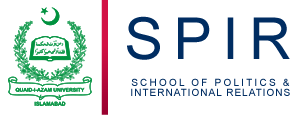School of Politics and International Relations (SPIR), Quaid-i-Azam University in collaboration with Hanns Seidel Foundation (HSF), Pakistan organized two days International Conference on; Securitising Non-Traditional Security Dynamics in South Asia: Contemporary Challenges and Future Trajectories. The Purpose of the conference was to chart out the ways in which non-traditional security challenges in South Asia can be securitized and identify the opportunities it provides for regional cooperation.
In the Inaugural Session Dr. Farhan Hanif Siddiqi, Director, School of Politics and International Relations welcomed the speakers and dynamic audience. He said the objective of the conference is to enter into a meaningful discourse on securitizing non-traditional security challenges in South Asia and to bring voices from Afghanistan, India, Sri Lanka, Nepal, Pakistan, and the rest of the region on this crucial subject.
Dr. Steffen Kudella, Resident Representative, Hanns Seidel Foundation Pakistan, elaborated that academic research is objective, transparent, logically consistent, verifiable, honest, and lastly but most importantly relevant. He said HSF has always tried to strengthen this kind of research on non-traditional security issues in Pakistan and the region.
Dr. Raja Qaisar Ahmed, Registrar, Quaid-i-Azam University, welcomed such academic engagements and stressed the promotion of open spaces for such critical debates. He stressed that this is high time to go beyond the established narratives of security and build new knowledge for better future trajectories.
In the keynote address Dr. Syed Rifaat Hussain, Professor of Public Policy, at the National University of Science and Technology (NUST), Islamabad explained the history and evolution of the concept of non-traditional security. He elaborated that Geopolitics includes 1) access and control over resources 2) interdiction of these resources 3) denial of these resources to the enemy.
He said Geo-economics, on the other hand, deals with resource nationalism. Through their interplay, the two create the modern world order. He further explained the features of the contemporary South Asian System.
Session I of the conference, “Conceptual and Theoretical Foundations of Non-Traditional Security” was chaired by Dr. Zafar Nawaz Jaspal, Professor, SPIR, QAU. Among the panelists Dr. Muhammad Mujeeb Afzal, Assistant Professor at the School of Politics and International Relations argued that securitization theory has helped us understand the power play of politicians and decision-makers in the formulation of national security policy. The second panelist, Dr. Suba Chandran, Professor and Dean, National Institute of Advanced Studies, Bangalore, India elaborated on conceptualizing and contextualizing non-traditional security. The last panelist of the session I, Dr. Arshi Saleem Hashmi, Professor of Peace and Conflict Studies, at the National Defense University, Islamabad discussed the regional and transnational non-traditional security challenges and how the states after identifying them, may be able to come up with coordinated efforts to deal them.
The Session II of the conference, “Economics, Trade, and Development in South Asia” was chaired by Dr. Aisha Younus, Assistant Professor, SPIR, QAU. Among the panelists of this session were Dr. Vaqar Ahmed, Deputy Executive Director, Sustainable Development Policy Institute (SDPI), Islamabad Ms. Ammara Durrani, Assistant Resident Representative, United Nations Development Programme (UNDP), Pakistan and Dr. Sukalpa Chakrabarti, Deputy Director and Associate Professor, Symbiosis School of International Studies, Pune, India. A large number of students, researchers, and faculty members attended the event. The Day II of the conference will continue with similar zeal and zest.

